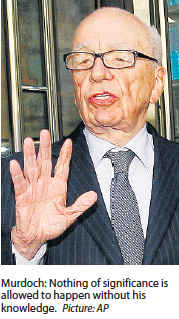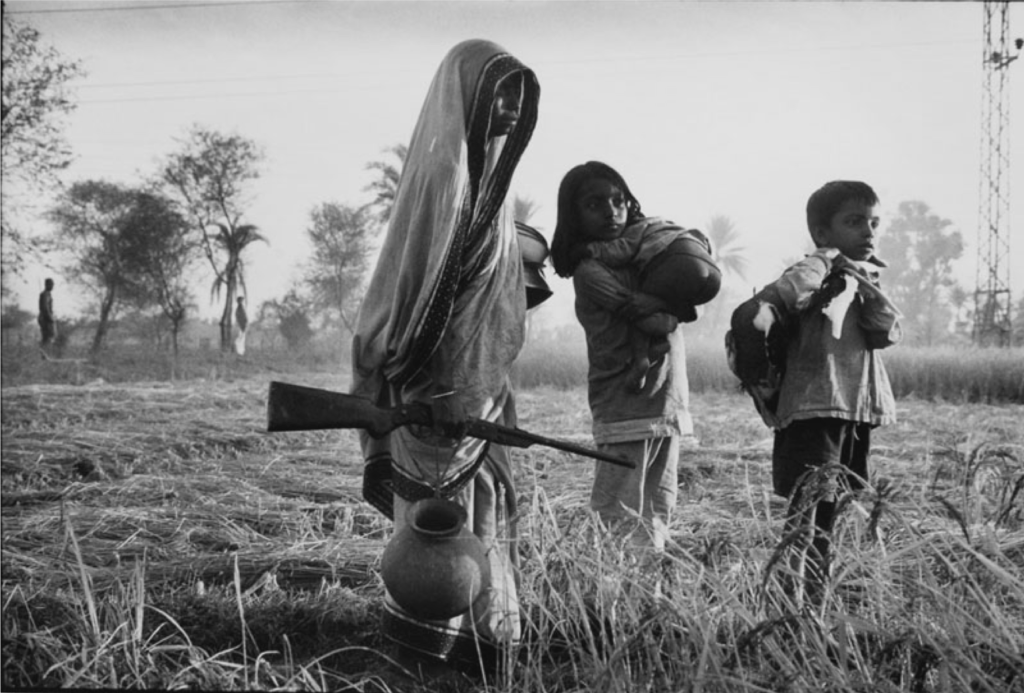
Fig leaf of ?Press Freedom? lifted from Murdoch press
Cyril Pereira
HONG KONG
Sunday, 17 July, 2011 | THE BRUNEI TIMES A17
OPINION
The Brunei Times

What does that say about printed news in the Digi-logue era?
ASKED what his priority was upon arrival in London to take charge of the unraveling of his UK newspaper, News of the World (NoW), Rupert Murdoch pointed to his red haired CEO of News International, saying ??Her??.? That gave the game away.
Rebekah Wade (before she became Mrs Brooks) was editor of the NoW when much of the celebrity phone hacking and cheque – book journalism scandal was rampant.? She was promoted to CEO by Rupert. She was in charge of the internal investigation that declared it to be the work of one rogue reporter. Some charitable commentators speculate that Rebekah Wade was covering up the scandals from the chairman who knew nothing.
Anyone familiar with how the Murdoch organisation works will know that nothing of significance is allowed to happen in any part of the global empire without direct approval of The Boss. None of his minions dare risk any initiative without express permission. After securing that, they gloat over lesser minions in turn, ordering them to charge up whichever hill.
Rebekah Wade knows too much of how high up the phone-hacking, pay-offs to police and hush money to victims was sanctioned. At the Parliamentary hearing will she confess? She has stood steadfast so far, denying any knowledge of these shenanigans. But if she were subsequently to be charged for complicity in criminal activity, will she spill the beans on her boss?? Murdoch? is? a? master of realpolitik and the mesmerising power of money. He knows only too clearly where his priority lies in this case. Will Rebekah Wade endure a term in prison with her trap shut, like Andy Coulson before her?? Let us watch this morality play unfold.? Loyalty more than competence, is prized highly infamily businesses. It plays to the insecurity of the owners. At News Corporation that is worth gold.
How did NoW & The Sun hold such influence in the digi-logue era?
Ingrained in the British polity is a free press pride of mythic proportions. Murdoch converted that to a licence to print money by feeding the prurient and voyeuristic instincts of society.? British institutional reluctance to interfere with the mechanics of a rigorous press worked to his advantage. ?Using this fig-leaf of press freedom, his gutter press outreached.
??Give the people what they want?? was his amoral justification for a diet of boobs on Page 3 of The Sun and lurid sexual peccadillos of politicians and celebrities across NoW pages. Mr Murdoch?s low opinion of his readers is amply summed-up by a former managing director: ??Most people are like sheep. Let?s shear them.??
Often innuendo was enough to ruin careers and reputations. It sold his newspapers vigorously ahead of his more inhibited rivals.? Neither Murdoch nor his editors cared about the lives they broke.? They never let facts get in the way of a good story. An editorial fund to pay off victims who initiate libel suits was just a cost of doing business.? To keep up a daily menu of startling disclosures year after year for this cynical publishing formula, required stretching beyond court hearings and crime beats (available to all newspapers). It required hacking into private telephone conversations, voicemails, sms plus paying sleuths to steal confidential banking and hospital records.
This yielded rich dividends for the Murdoch papers. They were never short of saucy leads, embarrassing photographs or helpless victims. They ??scooped?? the competition routinely.
The other tabloid rivals have shown remarkable restraint in not putting the boot into the Murdoch press. There is widespread suspicion that they are also guilty of phone-tapping and payments to police. Parliamentarians are calling for a comprehensive investigation into the links between the police, tabloids and the shadowy world of private detectives.
The toothless Press Complaints Commission (PCC) has again been unmasked as an utterly ineffective entity created not to self-regulate but to block independent investigation of errant members. Following the current NoW controversy, Parliament has pledged to scrap the PCC and replace it with a body independent of both the newspaper industry and government.
Digital disruption of news monopolies
The dominance of NoW and The Sun in the UK is all the more remarkable when elsewhere the Internet, Blogs, Facebook and Twitter have evolved a dynamic ecosystem of crowd-sourced, realtime, instantaneous horizontal distribution of news, views, opinion and debate.
It was Dr Indrajit Banerjee, a Director at Unesco in Paris who coined the term ??Digi-logue?? to describe converging analogue and digital technologies and content flows. His point was that the established academic ways to map,?study and analyse Press, TV, Radio & Online channels as parallel communication?need to be radically reframed to make sense of the new realities. The boundaries are blurred and new possibilities are enabled.
Dr Andrew Taussig and I were privileged to be invited to address the Plenary session he chaired at the recent AMIC Conference in Hyderabad – on precisely this phenomenon.
For near 200 years newspapers perfected a super-efficient cycle of news production and mass distribution in a controlled, linear process with the editor at the centre.
The editor decided what will be printed and how the story will be told. More importantly, he decided what will NOT be printed and which stories will NOT be told.? The true power of the press was its ability to hide critical matters from public knowledge. Authoritarian governments and Big Business leveraged compliant editors to mislead the public.
The digi-logue environment has broken that stranglehold on news and opinion which mainstream press and TV enjoyed. Tweets from Sohaib Athar in Abbottabad:?A huge window-shaking bang here in AbottabadI hope it?s not the start of something nasty? was the first indication of the remarkable American raid on Osama bin Laden?s hideout which left the Pakistani military clueless even after the helicopters left with his body. No reporter was there to file the story.
Nic Newman of The Reuters Institute at Oxford University says that Twitterers are ??influencers??.? ??The audience isn?t on Twitter but the news is on Twitter.?? Celebrities and politicians now regularly tweet their daily meetings and travels with a growing fan network. Sashi Tharoor, former UN Under – Secretary General and later junior minister in India?s Foreign Ministry, got into trouble for his tweets on meetings with foreign dignitaries and for lamenting travelling ?cattle-class? to conform to the Congress Party?s strictures on public travel for MPs.
Alternative media compensate for discredited mainstream media
Closer to home, Singapore?s recent elections and the ongoing Malaysian politics demonstrate the far reaching effects of social media, mobile communications and the Internet as citizens initiate, share, query and distribute information virally to groups and individuals without the agency of mainstream press or TV.
This is having interesting effects on the behaviour of journalists, editors and politicians. Mainstream press which once dismissed Bloggers out of hand, now follows the established ones closely to track the cyberchatter of posts and counter-posts. They quote Bloggers in press reports. ?The Malaysian government has invited Bloggers to press conferences. Dr Tony Tan bidding for Presidential elections in Singapore, announced his decision on a Blogging platform to reach young voters.
Governments and their intelligence agencies are vigilantly tracking cyberchatter for clues to political sentiment and the public will. The Chinese government is particularly adept at this silent eavesdropping. It has resulted in delayed statements from the Prime Minister to address public anger about rising food prices and unaffordable housing.
This crowd-sourced feedback bypasses the inefficient and unreliable network of spies and informers who filter intelligence for their political masters. In some ways this is an amplified, authentic mirror of public sentiment to governments which hopefully will reduce misbehaviour of the power structure.
What are the lessons for the business of News?
It is all out there. The news process is becoming a ??curation?? of content from formal, informal and co-opted amateur sources on mobile phones, You Tube, Facebook and Twitter. Trusted brands have an advantage in credibility on all platforms which consumers access at different times of the day, from home to office and back. The people, formerly known as the audience, now participate in the process of news creation, sharing and verification.
Digital distribution of rich media blurs the previous distinction between printed, online and broadcast channels. News producers have to become multimedia?orchestrators for consumers who want to read, see, hear and experience news. Tablet publishing is the first such integrated rich-media platform for busy citizens on the go.?The garden variety reporter will be useless. Domain experts who comment, analyse and contextualise news will be needed to add value to content. News will be channel agnostic.?Dependency on advertising will diminish as news businesses find new revenue streams from consumers, brands and transactions.
Cyril Pereira is the Co-Chairman of Asian Publishing Convention



